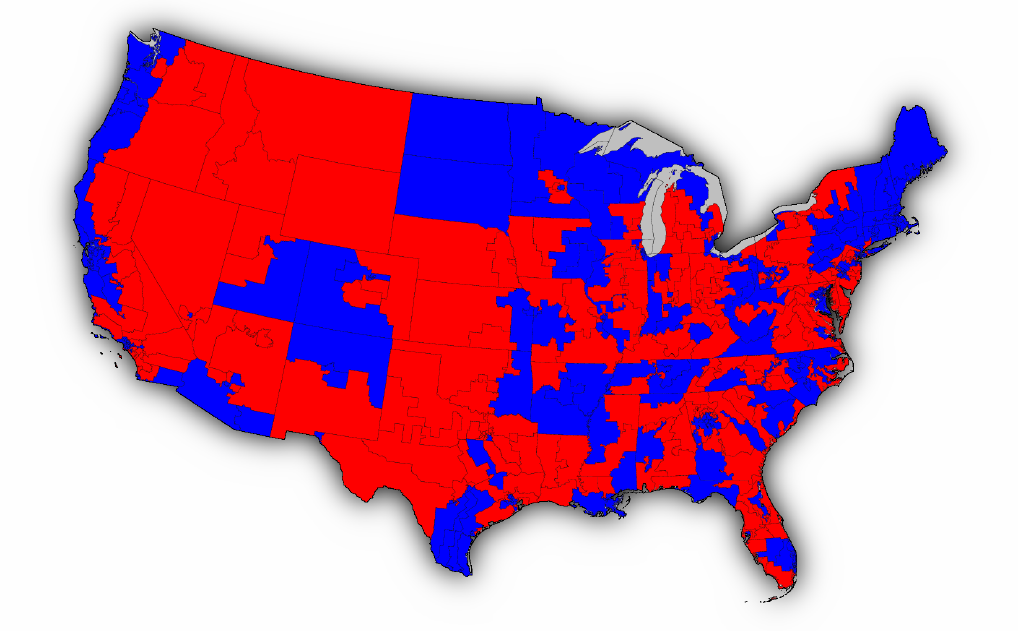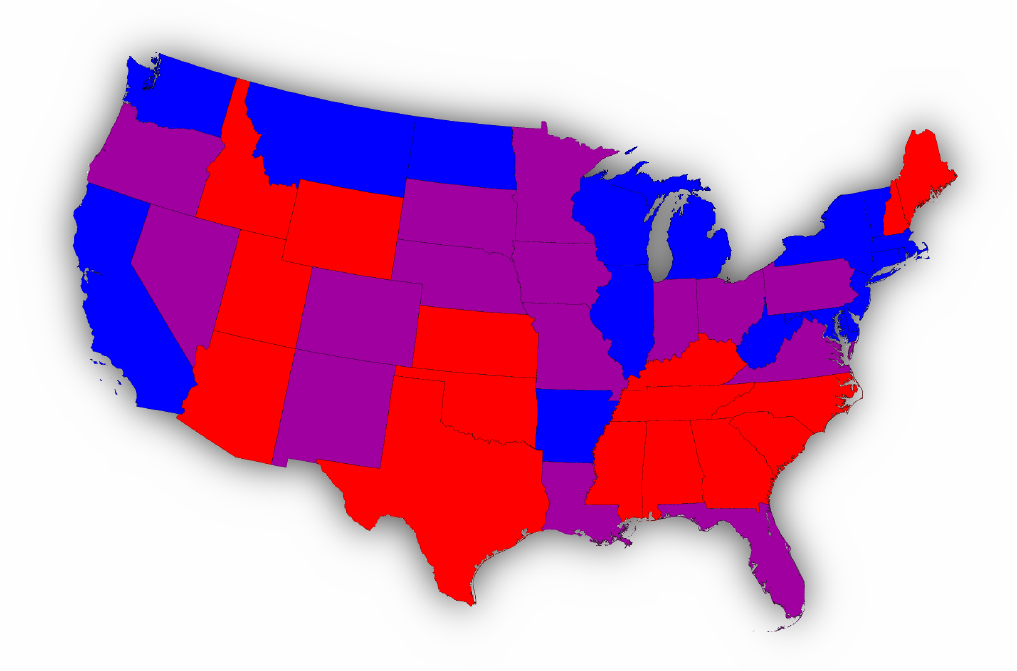Move over
Republican Revolution, the
DEMOCRATIC DOMINATION has just begun. After 12 years in the wilderness, the Democrats finally regained all houses of Congress from the GOP. They gained at least 30 seats in the House of Representatives, bringing them a majority of at least 232 seats (with only a few races yet to be called). In the Senate, Jim Webb's close victory over incumbent George Allen of Virginia gave the Democrats a slim majority of 51-49 in the chamber (the number includes 2 independents who caucus with the Democrats: Vermont's Bernie Sanders and Connecticut's Joe Lieberman, who had lost the Democratic primary for his support of the Iraqi conflict but subsequently defeated Democratic challenger Ned Lamont). Other than Virginia, the Democrats won the Senate seats previously held by the GOP in Missouri, Montana, Ohio, Pennsylvania, and Rhode Island (ironically, the incumbent Lincoln Chafee was one of the few Republicans who opposed the Iraqi conflict and Bush's policies) while holding on to open seats previously held by Democrats in Maryland, Minnesota, and New Jersey. The Democrats were in control of nearly every congressional district in New England (comprising the states of Connecticut, Maine, Massachusetts, New Hampshire, Rhode Island, and Vermont) with the exception of Christopher Shays of Connecticut, thus making him the only Republican from that area. In the gubernatorial elections, the two parties switched numbers with the 28 states now in control by Democratic governors and 22 still with GOP governors, a difference of 6 governorships. Ted Strickland became Ohio's first Democratic governor in about 16 years. Deval Patrick of Massachusetts became not only the state's first Democratic governor since Michael Dukakis, he was also the state's first black governor and only the second in the nation (after L. Douglas Wilder of Virginia). And Eliot Spitzer, the state attorney general well known for his crackdowns on corporate crime, won a landslide to replace Republican George Pataki as the governor of New York.
Despite the victories, the Democrats also suffered a few setbacks. Here in California, which has generally been a blue state (especially with 2 Jewish female Democratic senators representing it), Arnold Schwarzenegger easily defeated the Democratic challenger, state treasurer Phil Angelides. Rep. Harold Ford, Jr. of Tennessee lost his bid to replace Republican Sen. Bill Frist (then the Majority Leader) and become the first black senator from the South since the Reconstruction in light of a
negative ad run by his opponent, deemed racially insensitive by many. And Tammy Duckworth, a decorated Iraq veteran who lost both legs in combat, lost in a close House race in Illinois, though there might be a possibility of a 2008 rematch.
The election produced lots of political firsts: Rep. Nancy Pelosi of California, formerly the House minority leader, became the first female Speaker of the House in US history. Sen. Harry Reid of Nevada became the first Mormon Senate Majority Leader. Keith Ellison of Minnesota became the first Muslim ever elected to Congress, while Mazie Hirono of Hawaii and Hank Johnson of Georgia became the first Buddhists elected to a US governing body. By the time the 110th US Congress convenes next year, there will be 16 female senators (a record number), 13 Jewish senators, 1 black senator (Barack Obama of Illinois, elected in 2004), 3 Hispanic senators, 2 Asian senators (both representing Hawaii), 71 female representatives (including new Speaker of the House Nancy Pelosi), 42 black representatives (non-voting delegates included), 30 Jewish representatives (Eric Cantor of Virginia is the lone Republican), 27 Hispanic representatives, 4 Asian/Pacific Islander representatives (including Fil-Am Robert C. Scott of Virginia), and one Native American representative (Tom Cole of Oklahoma).
Not every single Democratic incumbent lost their seat, not every single open seat left by the Democrats was taken over by the GOP, and not every single Republican candidate won (except for some open seats previously held by Republicans), as evidenced by this map showing the results of the Senate and gubernatorial races (SENATE- Light red= Republican hold, Blue green= Democrat hold, Dark blue= Democrat pickup, Light yellow= Independent hold, Bright yellow= Independent pickup/GOVERNORS- Dark red= Republican hold, Dark blue= Democratic hold, Light blue= Democratic pickup):


The new House composition (Blue= Democrat, Red= Republican):

The new Senate composition (Blue= 2 Democrats, Red= 2 Republicans, Purple = 1 from each party):

Hawaii currently has 2 Democratic senators and Alaska has 2 Republican senators.
The new party control of the state governors (Blue= Democrat, Red= Republican):

Also of interesting note, the incumbent congressmen Stephen Colbert personally interviewed for his popular "Better Know A District" segment in The Colbert Report all won re-election with the exception of Major Owens of New York, who had retired his seat this year. This also includes non-voting representatives Eleanor Holmes Norton of Washington D.C. (subject of one of the great BKAD segments) and Donna Christian-Christensen of the US Virgin Islands. Norton, along with another BKAD subject, Robert Wexler of Florida (who had ran unopposed and "admitted" to enjoying cocaine & hookers on the show), later appeared in the special midterm episode. When some congressmen refused to appear on the segment in the midst of the campaign season, Colbert interviewed their respective challengers instead. Unlike the incumbents, only one of the challengers won, former Orleans lead singer John Hall who now represents New York's 19th district. Hall re-appeared on the show after his victory and sang an a cappela rendition of The Star-Spangled Banner with Colbert.
Colbert, in his "Stephen Colbert" mode, launches into a brilliant absurd rant in reaction to the Democratic victories before walking out (but later coming back) from his show:
His first "Word" segment on the first day of the Democratic Domination:
And to cap it all off, a special In Memoriam video for the Republican majority:
---

To "celebrate" the Democratic victories, I was finally able to catch the new film Borat: Cultural Learnings of America For Make Benefit Glorious Nation of Kazakhtan (check the first 4 minutes here). It had been sold out due to its limited release but has since expanded to many theaters. The film stars Sacha Baron Cohen, best known for his wannabe-gangsta rapper character Ali G and as gay French race car driver Jean Girard in the Will Ferrell film Talladega Nights, as Borat Sagdiyev, a naive, bigoted yet affable journalist from Kazakhtan who journeys across America and along the way encounters many people who in the process obliviously express their prejudices on film.
OK, so what if many of the people who appeared in the film are filing lawsuits against him, not to mention that he duped an entire Romanian village. Was it mean spirited? Yes. Was it offensive? Yes, but to prove a point like South Park. Was it hilarious? Did it satisfy me? Was it worth the price of admission? You're goddamn right it was! This is hands down one of the funniest films of the year, no wait... make it the decade... no! the 21st century! Hmmm... let's just make it of all time! Baron Cohen delivered with his semi-improvised performance and is definitely up there with the likes of Andy Kaufman, The Marx Brothers, the Termite Terrace gang, John Waters, and Joe Dante as a master in comic anarchy.
















